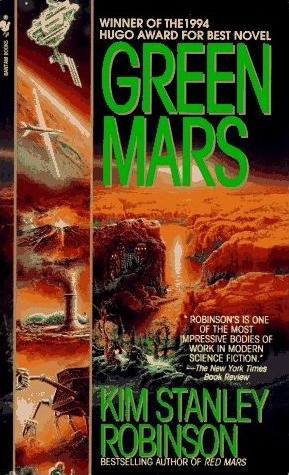Green Mars

It follows the efforts of the Martian underground, after the failed revolution in Red Mars, to organize and plan for the day they will achieve independence from Earth -- but the agendas of the numerous groups of the underground differ greatly -- all the while the terraforming of Mars continues.
Structure
(to develop)
Timeline
2061 The Unrest
2075 Jackie and Dao born
2076 (M-year 25) Nirgal born
2090 Nirgal and Coyote south polar circumnavigation
2100 second elevator lands at Sheffield
2101 soletta into position
2102 M-38 conference on terraforming, Burroughs
2104 Dorsa Brevia conference
2106 aerial lens incident
2108 Deimos incident
2115 Nirgal Vallis covered
2120 West Aquifer discovered
2123 M-year 50 celebration
2124 Sabishii curfew
2127 Antarctic incident
Summary
Areoformation
Point of view: Nirgal
The Ambassador
Point of view: Art
The Long Runout
Point of view: Ann
The Scientist As Hero
Point of view: Sax
Homeless
Point of view: Michel
Tariqat
Point of view: Nirgal
What Is To Be Done?
Point of view: Nadia
Social Engineering
Point of view: Sax
The Spur Of The Moment
Point of view: Maya
Phase Change
Point of view: Nadia
Characters
(to develop)
Themes
(to develop)
Quotes
- [Michel:] "In archetypal terminologies we might call green and white the Mystic and the Scientist. Both extremely powerful figures, as you see. But what we need, if you ask me, is a combination of the two, which we call the Alchemist." (p.15, Areophany)
- [William Fort:] "In a capitalist world, the word capital has taken on more and more uses. Human capital, for instance, which is what labor accumulates through education and work experience. Human capital differs from the classic kind in that you can't inherit it, and it can only be rented, not bought or sold." (p.77, The Ambassador)
- He [William Fort] concluded that strictly speaking, there was no such thing as altruism. It was only selfishness taking the long view, acknowledging the real costs of behaviour and making sure to pay them in order not to run up any long-term debts. (p.84, The Ambassador)
- [Sax:] "Our disagreement is another facet of what people call the fact-value problem. Science concerns itself with facts, and with theories that turn facts into examples. Values are another kind of system, a human construct. (p.144, The Scientist As Hero)
- Human reality could only be explained in terms of values. And values were very resistant to scientific analysis. (p.220, The Scientist As Hero)
- What was personal gain but the freedom to do what you wanted to do? And what was power but the freedom to do what you wanted to do? And once you had that freedom, any more wealth or power actually began to restrict one’s options, and reduce one’s freedom. One became a servant of one’s wealth or power, constrained to spend all one’s time protecting it. (p.235, The Scientist As Hero)
- [Desmond:] "Some people like to tell others what to do. They like that more than freedom. Hierarchy, you know. And their place in the hierarchy. As long as it’s high enough. Everyone bound into their places. It’s safer than freedom. And a lot of people are cowards." (p.235, The Scientist As Hero)
- [Vijjika:] "Rituals should have some unpleasantness, or you don’t appreciate them properly." (p.291, Tariqat)
- [Nirgal:] "You can't choose your childhood, it's just what happens to you. But after that you choose. I chose Sabishii. And that's really what made me." "Maybe," Art said, rubbing his jaw. "But childhood isn't just those years. It's also the opinions you form about them afterward. That's why our childhoods are so long." (p.300, Tariqat)
- [Desmond:] "But all the good plans are crazy, aren’t they." (p.312, Tariqat)
- [Desmond:] "You can’t get any movement larger than five people without including at least one fucking idiot." (p.315, Tariqat)
- [Zeyk Tuqan:] "What we need is equality without conformity." (p.338, Tariqat)
- [Desmond:] "That’s libertarians for you —- anarchists who want police protection from their slaves." (p.370, What Is To Be Done?)
- [Michel:] "The truth is not a very good lover." (p.402, Social Engineering)
- It was precisely in the moments of greatest need when people could do the least for each other. (p.520, The Spur Of The Moment)
- [Michel:] "You only put your full effort into a thing when there is no going back." (p.622, Phase Change)
Reviews
- Val's Random Comments
- Cheeze Blog
- adamosf - Visions of Paradise
- Adam Whitehead - The Wertzone
- Ethan - Examined Worlds
Resources
- Green Mars at The Internet Speculative Fiction Database
- Green Mars at Google Books
